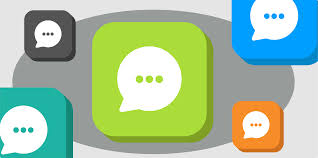
An Extensive Guideline Of A Messaging App Development

The class requirement is to build healthy lines of communication. The current market situation requires hierarchical solidarity within a company to stand out. Because we understand all the digital needs of an entrepreneur, we’ve created comprehensive guidelines for the development of a massaging app. Don’t get surprised if you find answers to all kinds of questions that come to your mind at some point. Therefore, let’s start with the first step in any business, market analysis.
Market Analysis
Ever wondered if building a messaging app was worth it, given the number of messaging apps out there?
If we look at WhatsApp to understand the market potential, few users will attest to how popular the messaging app is. As of July 2017, one billion WhatsApp users are using the app every day. In 2019, the number of WhatsApp users had become 1.5 billion. WhatsApp users have reportedly sent around 65 billion messages.
The current scenario is that WhatsApp serves users from various backgrounds.
What do these numbers mean?
Huge potential. Think about it. Such applications provide an expression environment. Nowadays, people try to explore the world by connecting with other people through digital devices. We want to share our views, opinions, and talents with others and a personalized messaging app further enriches global conversations. Users have more than one messaging application on their digital devices. Your idea of a messaging app can add value to your experience. Also, you can gradually improve the application with innovative ideas.
However, before getting to that head-on, it’s a good idea to gather information and set realistic business goals because once you know what to expect from a company, it’s easier to figure out how to go about it.
Essential Functionalities-
The real-time chat feature helps users connect with other people easily. This connection relies on several essential functions, such as:
Registration and authorization – Users can set up their messaging profiles and then link them to their social media profiles. You can authorize the account via social media, mobile numbers, or email. In a messaging application, the database cluster is responsible for storing profiles, chat history, and more. It must support replication and archive.
Import Contacts – An application that can scan contacts and import them to the server. You can also allow users to import their social media contacts.
Instant Messaging – This is an essential feature of any messaging app. One of the many users can connect on apps in a private or group chat. Most messaging apps provide message delivery notifications, which we can use to track the message. You can use your application by adding innovative functions. You can get inspiration from ideas like a message that self-destructs after a while, or something as basic as not sending or deleting a message you’ve sent. Make sure you don’t neglect basic features, such as allow group administrators to add or remove members in group chats and make other members of the administrator. For example, Telegram has a feature that will enable group administrators to limit the number of messages a group member can send. This functionality is dependent on the messaging application architecture. The remainder of this publication covers architectural and technical considerations in detail.
Voice and Video Calls – In 2015, WeChat introduced a feature that allows users to make voice and video calls on Messenger. (https://qz.com/443441/stop-texting-right-now-and-learn-from-the-chinese-theres-a-better-way-to-message/). Currently, we have started taking this function for granted. Users will appreciate this feature in the messaging app.
Multimedia sharing – GIFs and images have become a way for users to express themselves. Even with formal establishments, sharing essential and useful media files becomes a necessity.
Edit main photos and videos – If users can quickly edit, crop, or decorate images while sharing, they don’t have to exit the app repeatedly. WhatsApp allows users to edit photos and change the length of the video before sharing it.
Geolocation tracking can improve practical user performance by allowing users to post, share, and explore their location.
App development
From questions like whether you want to build a responsive native or cross-platform app to designing the UX / UI for your app, the process requires persistence and commitment on your part. Application development is an ongoing process. Even if you follow your vision and add all the features as planned, you will need to keep working to improve it in the future. We all know the incredible speed of technological advancement. It’s no surprise, then, that more updates are available in less time. For example, natural language processing is now possible. If the Google API recognizes 120 languages and dialects, Microsoft Azure Cognitive Services can translate well.
You’ll also need a marketing strategy that highlights your app’s specialties and directs you to the right audience. Once the app starts, you can get feedback from users and make improvements if necessary.
In the end, you can make your vision come true with the help of detailed market analysis. As we have seen, there are many things to consider and decisions to make. Understand the process, then go one step further. Their innovative ideas will help you create a unique messaging app. All you have to do is learn from the best but think outside the box. Let success inspire you instead of being afraid of the apps that are already out there because you need courage and clarity to help the world better connect.
Author Bio
This is Sharon Winget, Staff Writer with GoodFirms, a review and rating platform of top IT companies & software. A tech geek at heart, I firmly believe technology can transform societies. I enjoy blogging about web design, email marketing, and content marketing.
